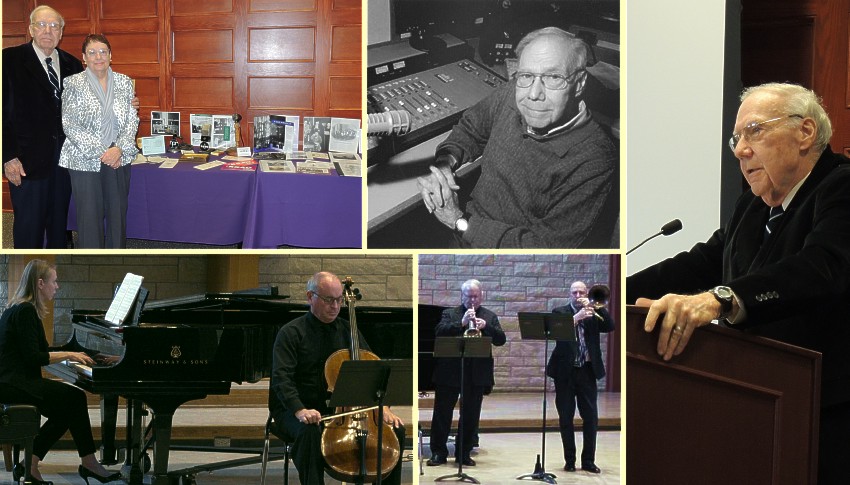Kansas Snapshots by Gloria Freeland - December 7, 2018
A bit richer
I can’t say I have ever looked forward to a funeral or memorial, but if I had known beforehand what the one I attended last Sunday
was going to be like, I may have.
The “celebration of gratitude and remembrance for the life of Ralph S. Titus” was one to remember. It fit Ralph’s personality -
elegant, simple, and heartfelt. But that personality could easily cause someone who had only a chance encounter with him to
underestimate the man.
I had known Ralph for years. I knew his work as a radio broadcaster for the university’s radio station KSAC, which later became KKSU.
His humble nature would provide no clue that he and four others planned National Public Radio’s current format. When President
Lyndon Johnson signed the Corporation for Public Broadcasting Act in 1967, Ralph was present. Wife Mary Ellen still has the pen
Johnson used to sign the act. The NPR format included the concept of expanded news coverage known as “All Things Considered.” It is
rated the most listened-to program in the U.S. by weekly listeners.
It wasn’t until I read Ralph’s obituary that I learned the first program grant from NPR was awarded to him for a 13-week series on
Dwight D. Eisenhower. From the World War II years, Ralph interviewed Gen. Omar Bradley, who worked side-by-side with Eisenhower, and
Harry Butcher, who was Eisenhower’s personal aide. From the political arena, he spoke with Vice President Hubert Humphrey. David
Eisenhower gave his perspective as Eisenhower’s grandson.
When the program was completed, it aired on NPR, the BBC and Voice of America.
Those who spoke at the service mentioned what a great interviewer Ralph was. He always did his research beforehand, and then listened
carefully to the answers so he could ask good follow-up questions.
Others mentioned his love of photography. One said he still has the framed portrait Ralph took of his son. Another mentioned that
composer Aaron Copland so loved the picture Ralph took of him that he used it for his official photograph for years. A copy of it
now resides in the Library of Congress.
People also talked about his patience as a mentor, his great voice, his contagious laugh and his courtly, gentlemanly manner. Several
spoke about loving to discuss literature, music and politics over endless cups of coffee at Ralph and Mary Ellen’s home.
I had the pleasure of being in their home one time when I was doing historical research on journalism and KSAC. I, too, was pleased
to spend a bit of time talking about something we were all passionate about.
When I coordinated the 2010 centennial celebration for the journalism and mass communications department, I asked Ralph to be the
co-master of ceremonies. He hesitated and then said, “I wouldn’t do it for just anybody, but I’ll do it for you.” That meant the world
to me.
In October 2013, our department sponsored the Great Plains Radio History Symposium dedicated to KSAC/KKSU and student-operated station
KSDB 91.9 as part of K-State’s sesquicentennial celebration. Ralph and Mary Ellen were front and center to share their knowledge of
and love for KSAC and to show the many historical items they donated to K-State’s special collections department.
Along with history, Ralph, Mary Ellen, Art and I share a love of traveling. For several years before any trip to London, we’d ask
their advice on things to see and hear. It was at their suggestion that we attended the 2012 “Beating Retreat” Review of the Horse
Guards parade at Whitehall in London - a ceremony dating to 16th century England that was first used to recall nearby patrolling units
to their castle. It was among the highlights of our visits to London.
The four of us also share a love of music. Mary Ellen, a former elementary teacher, and Ralph have been active with the Manhattan
Arts Center for years. Mary Ellen suggested that we enroll daughter Katie and her cousin Larisa in summer violin
lessons at the center when they were about 11. Those lessons lead Katie to the local youth Gold Orchestra and eventually to a music
education degree at K-State.
Ralph and Mary Ellen have been loyal supporters of the university's Hale Library Concert Series, which frequently features the work of
K-State music faculty members. Pieces by composers Johann Sebastian Bach, Sergei Rachmaninov, Gioachino Rossini, Antoine de Kontski
and others were featured at the service. David Littrell was one of those performing. Littrell, University Distinguished Professor
of Music and the longest-serving K-State orchestra conductor, once told Art that one of his biggest musical influences was
listening to the classical music Ralph played on the university station when David was a youngster.
Art repeated Littrell’s comment to Ralph some years later. Always the one to play down his part, Ralph just laughed and said, “David’s
always given me far too much credit.”
After the service, I made my way to the foyer of nearby McCain Auditorium, where the family was hosting a reception. I caught up with
a few friends and gave Mary Ellen a hug.
“Ralph would have loved this, wouldn’t he?” she said.
He would have - good music, good people and good conversation.
On my way home, the quote by Austrian writer Hermann Broch on the front of the program ran through my head: “No one’s death comes to
pass without making some impression, and those close to the deceased inherit part of the liberated soul and become richer in their
humanness.”
The day had been a celebration of Ralph's life, and we are indeed all a bit richer for having known him.
